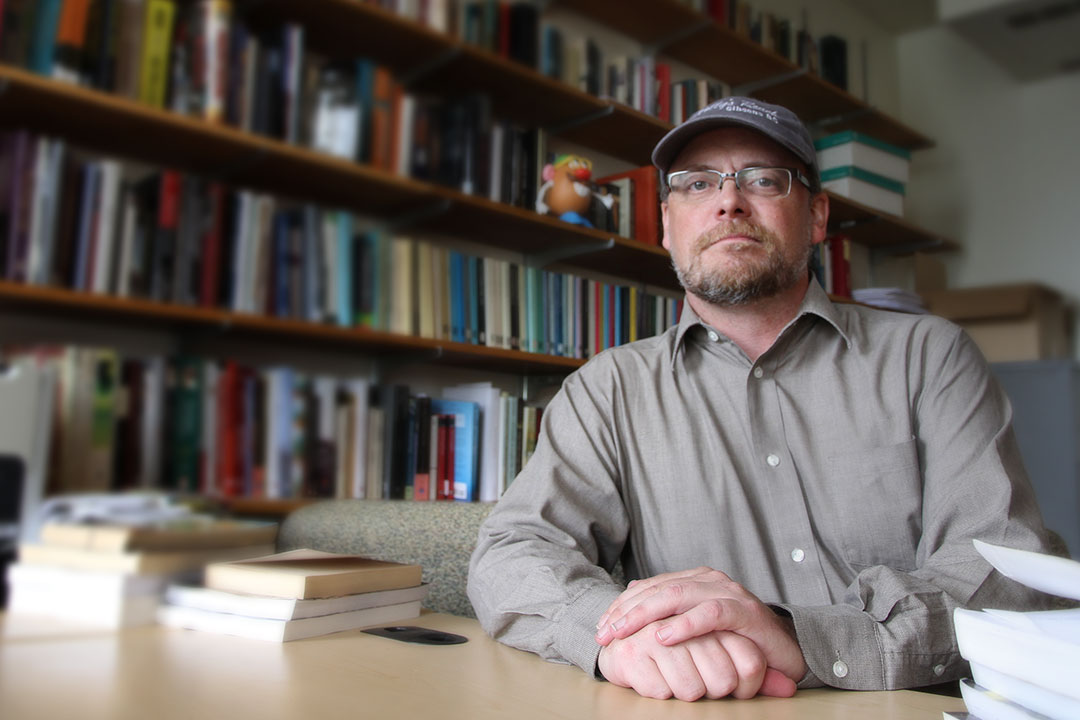
Flynn feeling comfortable in his new chair
The chair of University Council is typically seen as a position of some ceremony, yielding little in the way of surprise if they carry themselves with an appropriate level of formality.
By HenryTye GlazebrookBut Kevin Flynn, who will be taking over the role at the University of Saskatchewan this fall, prefers to keep things casual.
“I’m a ballcap wearer, and after I was elected the big question was whether I’d be wearing my hat as council chair,” he said, with a laugh. “Here’s your big scoop: I’m going to be wearing the hat—on the advice of a former chair, who said, ‘You’ve gotta be you.’”
This loose, relaxed style is one that Flynn likes to carry throughout his life, from his new role in council to his regular position as assistant professor in the Department of English. It also cropped up before he first joined University Council, when he lent his distinct sense of humour to his letter of self-nomination.
“I had just got tenure and completed a sabbatical, and I didn’t really know anything about the governance of the institution,” Flynn said. “My actual nomination blurb was, ‘I’ve been here for four years, and I don’t know anything about how this place works. It seems to me that being on council would be a good way to learn.’”
He’s since spent five straight years serving as a member of council, sitting on and eventually chairing the Academic Programs Committee. All the while he became more and more appreciative of his small role in what he believes is a profoundly important part of university leadership.
“I’m a booster for council,” he said. “Any chance I get, I’m saying to people, ‘You should run for council’ or ‘You should really think of sitting on a committee of council.’ This is where the real work of the university gets done.”
Flynn credits former chairs Dr. Jay Kalra and Lisa Kalynchuk for forging an exemplary path, and said he hopes to follow their lead as he grows into the role.
“I will bring continuity, I think, as the first thing—in terms of maintaining decorum in the body, of trying to be as efficient as possible and of maintaining good relation- ships between council and senior administration on one hand and students on the other,” said Flynn, who is scheduled to chair University Council for the first time on Sept. 21. “There were days, I’m told, when council did not get along so well with senior administration.
That has not been the case in the past few years, particularly since President (Peter) Stoicheff has been in office. It’s really important to maintain those connections. We don’t want to be building factions here. We’re here to work together to conduct the university’s business.”
There are some areas in which Flynn has set his eyes on polishing the council experience for all members, especially in regard to the dissemination of information and materials.
“We tend to get very large packages of council materials a week or a week and a half before a council meeting,” he said. “The last one we got in June was 490 pages, single- spaced. It’s a lot to expect of council members to do all that reading in at most two weeks, and to do it thoroughly enough to be informed for voting. I want to see if there’s a better way of doing this.”
In all respects, Flynn is confident and excited about this new responsibility—even if his informality ruffles the occasional feather. “No doubt there will be times that I mess up. Perhaps I’ll mistakenly try to vote for a motion,” he said, which a chuckle.
After five years of speaking up as a critic and advocate of submissions to council, it will be big change for Flynn to play a quieter, more managerial role. But he is prepared for it.
“It was exceptionally flattering to be nominated, and it was exceptionally flattering to have my colleagues applaud when my acclamation was announced,” he said. “I felt proud and welcomed, and I am determined to do a good job. I wouldn’t have stood for nomination if I didn’t think that I could.

